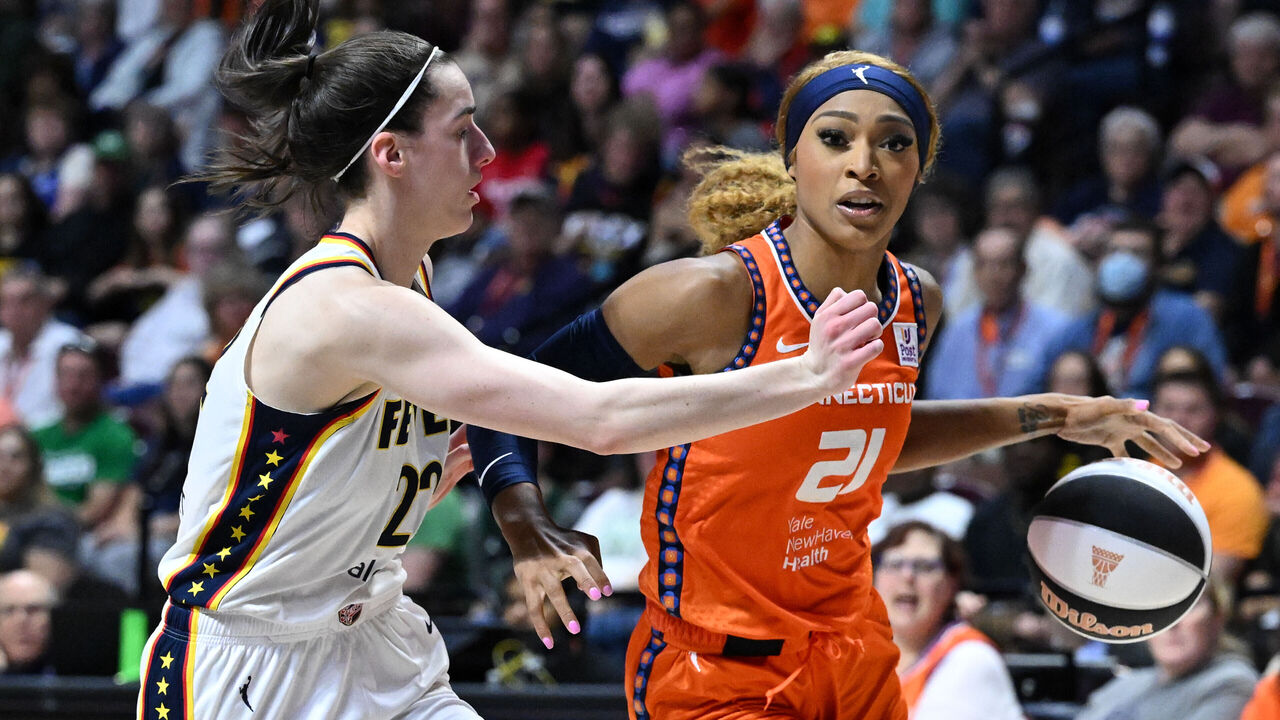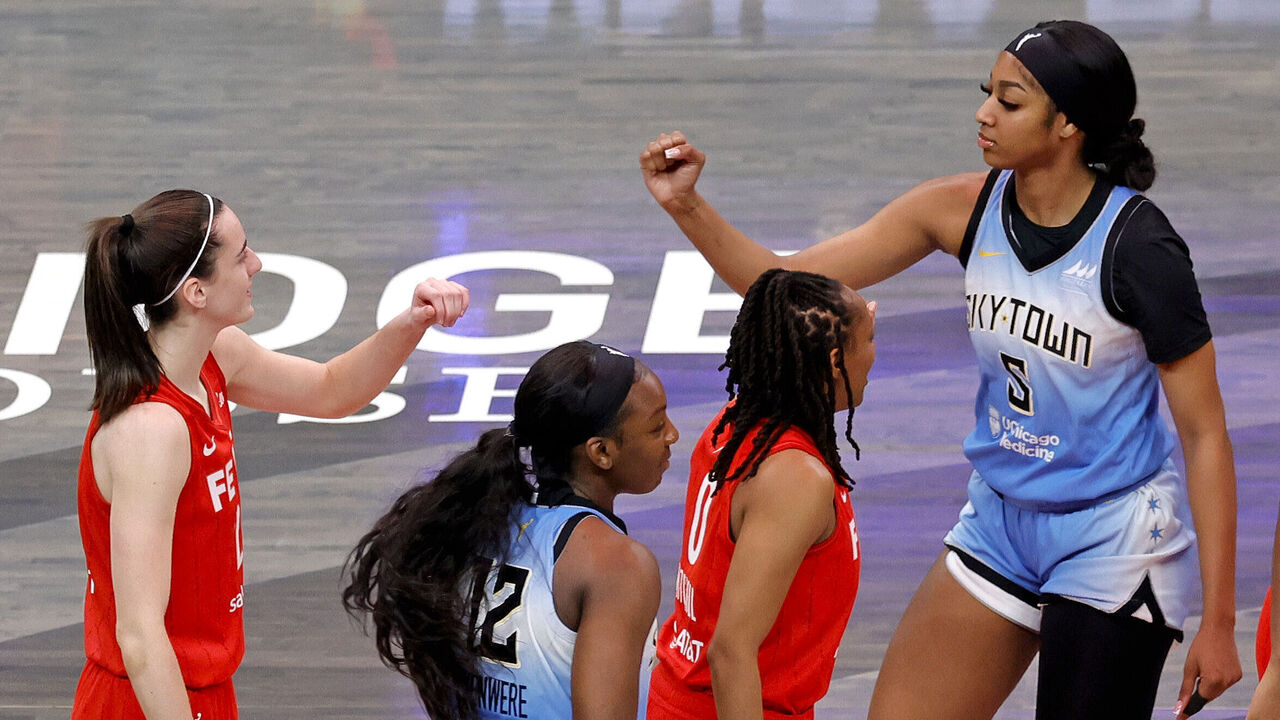Caitlin Clark didn't ask to be a cultural battering ram
During the period when LeBron James would annually embarrass the Toronto Raptors in the NBA playoffs, he was once asked in a postgame press conference about the racial abuse that Baltimore Orioles outfielder Adam Jones received at a game at Fenway Park in Boston that week.
In the moment, it seemed like a perfectly bizarre question to put to a basketball player, especially as it ended by asking James, "What must be done to eradicate racism from our society?"
Good game, LeBron. Now, please solve racism. And also inequality, the melting polar ice cap, and the disappearance of the A-list romantic comedy.
James, though, took it in stride like a bounce pass on a fast break. He spoke about trying to teach his children to be respectful to others and went on at some length about racism, ending with the point that those who have a platform should speak out and try to influence young people, "leading them the best way we can."
It was a thoughtful response, but LeBron was used to the demands of the media machine. He was 32 at the time, in his 14th NBA season, with multiple championships and MVP awards to his credit.
He was in a different place, that is, to where Caitlin Clark is today.
Clark, the 22-year-old WNBA rookie and most famous women's basketball player on the planet, can't seem to go more than a couple of days without being at the center of another media storm.
Last week, she was asked about being used as a weapon in the culture wars, where certain commentators point to her treatment by Black opponents as proof of some kind of league-sanctioned anti-white bent. Clark said she tried not to pay attention to any of that stuff, that her focus was on basketball.
That position lasted a few hours, as critics blasted her refusal to engage. DiJonai Carrington of the Connecticut Sun succinctly concluded: "Silence is a luxury."

Clark later said, before her Indiana Fever tipped off, that every player in the league "deserves the same amount of respect" and that "people should not be using my name to push those agendas."
But that wasn't the end of it. Clark was still criticized for not speaking out sooner. "You don't get to hide behind basketball when you've been anointed the transcendent, rising tide who will lift the WNBA to greater prosperity," admonished one The Athletic columnist.
But "hiding behind basketball" could also be characterized as "avoiding the cesspool that is social media." If Clark is trying to keep her head down and not get caught up in the media swirl that surrounds her, especially in the corners of the internet where racism and homophobia run rampant, that seems reasonable for someone who's been a professional athlete for a matter of weeks.
It's also not unusual for athletes to avoid weighty subjects in places like post-practice scrums and pregame availabilities, where the back-and-forth with reporters can be fast and the potential for a poorly phrased answer is considerable. Not everyone's LeBron, willing to lean back with a microphone and expound on the issues of the day.
If Clark has a defining trait in the non-basketball aspects of her young career, it's her evident desire to not become more of a media focus than she already is.
When USA Basketball last week announced a roster for the Paris Olympics that didn't include Clark, it set off days of coverage on whether she deserved a spot, and whether her presence was important for marketing reasons. She didn't weigh in on any of that, saying her exclusion was incentive to keep working and that one day she hoped to realize the Olympic dream.
A few days later, after an incident in a Fever-Sky game in which Angel Reese - the closest thing Clark has to a nemesis - attempted a block and made contact with her head, Clark didn't try to make it a thing. "It's just part of basketball," she said. "She's trying to make a play on the ball and get the block. It happens."

Her dedication to delivering boring quotes is one of the reasons why the degree of her stardom is a little hard to explain at this point. There are other examples of athletes whose celebrity quickly outpaces their competitive accomplishments - Tim Tebow comes to mind, as do any number of influencers-turned-boxers - but they usually fan the media flames, at least a little. And while Clark had a stellar college career and has been a good WNBA rookie, she hasn't been Tiger-Woods-romps-to-Masters-victory good in her initial foray into the pros.
But maybe none of that matters at this point. Clark's a star, and she gets talked and written about because of that - including this piece right here - and the stardom grows a bit more and the cycle continues. Which may be why missing out on the Olympics will be a blessing. Instead of daily questions about her role, and outsized coverage of a player on the end of the bench, she'll have a monthlong break while the WNBA shuts down. The firestorm that took off with her Iowa Hawkeyes' run to the NCAA title game and continued straight into the pros will finally lack for oxygen.
The culture-war types may even find something else to be outraged about, and the second half of the WNBA season would be less about Clark as a cipher for someone's daily gripe and more about whether she can get Indiana into the playoffs.
Probably not. But it's nice to imagine.
Scott Stinson is a contributing writer for theScore